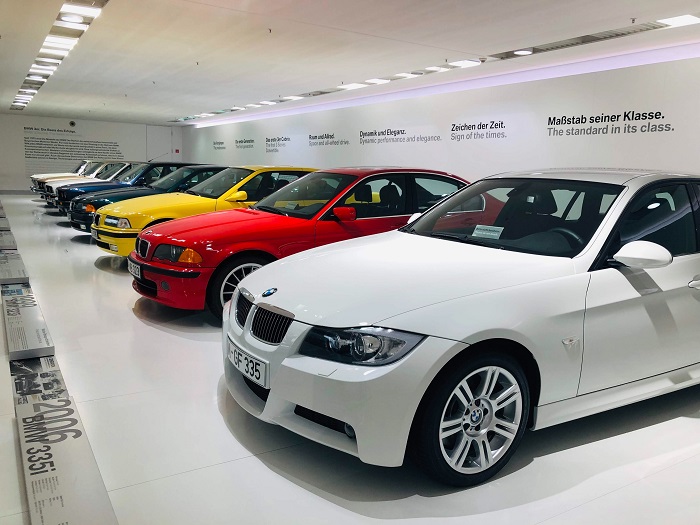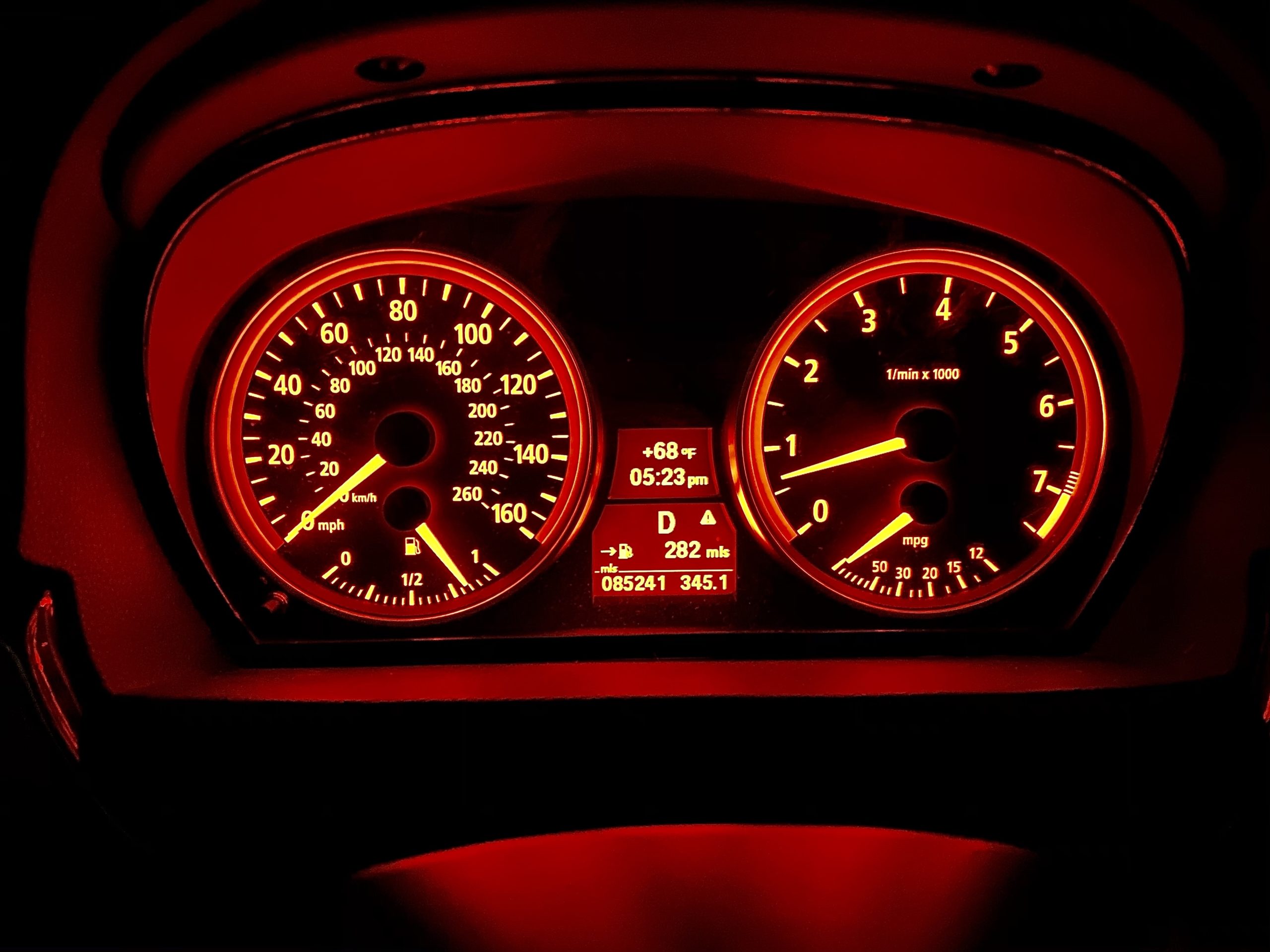The BMW e90 was introduced in 2004 as a replacement for the successful e46 model. The new model had a more aggressive design, with a wider stance and larger wheels. The interior was also redesigned, with new materials and better ergonomics.

In 2004, the e90 was the new benchmark
Upon its introduction in 2004, the BMW e90 quickly became one of the Bavarian carmaker's most popular models. With its stylish design, powerful performance and advanced technology, the e90 set a new standard in the D-segment. In the years since its debut, the e90 has continued to evolve, adding even more advanced features that made it one of the most innovative cars at the time.
Examples of these innovations:
- Connectivity features such as Bluetooth and USB integration
Today, these features are standard on most new cars, but back then they were advanced technologies that made it easier than ever to stay connected on the road.
- Self-driving power
The latest generation of e90s are equipped with self-driving capabilities that allow them to park themselves and even change lanes automatically. This technology was still at an early stage, but was certainly innovative.
- Improved safety features
The e90 has always been a safe car, but recent generations have added even more safety features, such as blind spot monitoring and lane departure warning. These systems help drivers avoid accidents by giving them information about their surroundings that they might not otherwise have.
Engines in the BMW e90/91
Like every BMW, this 3-series has a wide range of engines. From economical four-cylinders to the super fast M3 with an eight-cylinder. It came in both petrol and diesel, and a few more engines were added after the facelift in 2008. See the complete overview below:
The different versions of the E90/e91
The BMW E90 was available in different lines or packages with different features and specifications. Here is an overview of the main differences between the Business line, Executive line, M Sport line and High Executive line:
Business line:
The Business line is the standard package for the BMW E90. It includes basic features such as air conditioning, electric windows and a sound system. It can also include alloy wheels and a leather-clad steering wheel.
Executive line:
The Executive line is a step up from the Business line and includes extra features such as leather upholstery, a multifunction steering wheel and an upgraded sound system. It may also include larger alloy wheels, park distance control and a panoramic sunroof.
M Sport line:
The M Sport line is a performance package that includes a sports suspension, larger alloy wheels and sports seats with extra support. It also includes an M Sport steering wheel, M Sport body kit and M Sport wheels.
High Executive line:
The High Executive line is the top package for the BMW E90 and includes a range of luxury features such as leather upholstery, a panoramic sunroof, an upgraded sound system and a full-colour head-up display. It can also include features such as park distance control, adaptive headlights and a larger infotainment display.

Petrol engines:
316i: 1.6-litre four-cylinder engine with 122 hp
318i: 2.0-litre four-cylinder engine with 129 hp
320i: 2.0-litre four-cylinder engine with 156 hp
323i: 2.5-litre six-cylinder engine with 204 hp
325i: 3.0-litre six-cylinder engine with 218 hp
328i: 3.0-litre six-cylinder engine with 233 hp
330i: 3.0-litre six-cylinder engine with 272 hp
335i: 3.0-litre six-cylinder twin-turbo engine with 306 hp
M3: 4.0-litre V8 engine with 420 hp (only available in the E90 M3)
Diesel engines:
316d: 2.0-litre four-cylinder engine with 115 hp
318d: 2.0-litre four-cylinder engine with 143 hp
320d: 2.0-litre four-cylinder engine with 163 hp
325d: 3.0-litre six-cylinder engine with 197 hp
330d: 3.0-litre six-cylinder engine with 245 hp
335d: 3.0-litre six-cylinder twin-turbo engine with 286 hp
Please note that engine availability may depend on the region in which the car was sold and the year of manufacture of the car.
Engine problems N43, N45, and N46 (the 316, 318 and 320i)?
The BMW N43, N45, and N46 engines are known to have a number of potential issues. Here are some of the most common problems owners have reported:
- Faulty timing chain: The timing chain in these engines is known to stretch and wear prematurely, which can lead to engine damage and expensive repairs. You often hear this during cold starts (rattling sound).
- Vanos system failure: The Vanos system is responsible for controlling the variable valve timing in the engine. A failure in this system can lead to rough running, reduced power and higher fuel consumption.
- Faulty high-pressure fuel pump: The high-pressure fuel pump in these engines has been known to fail, causing starting and driving problems.
- Oil leaks: The N43, N45 and N46 engines are prone to oil leaks at the valve cover, oil filter housing and oil pan gasket.
The N43 in particular is known to be unreliable. This is in the post-2008 facelift model.
- Cooling system problems: These engines are known for cooling system problems, including leakage from the radiator, water pump and thermostat housing.
- Faulty ignition coils: The ignition coils in these engines can fail, causing ignition errors and engine running problems.
If you experience any of these problems with your BMW N43, N45 or N46 engine, it is important to have it diagnosed and repaired by a qualified BMW mechanic to avoid further damage and expensive repairs.
Engine problems N52, N53, N54 and N55 (6 cylinders)?
There are several known problems with the BMW N52, N53, N54 and N55 engines. Here are some of the most common problems:
- High-pressure fuel pump failure: The high-pressure fuel pump in these engines may fail, causing starting and driving problems.
- Faulty water pump: The water pump in these engines is prone to failure, which can lead to overheating and engine damage.
- Vanos system failure: The Vanos system is responsible for controlling the variable valve timing in the engine. A failure in this system can lead to rough running, reduced power and higher fuel consumption.
- Oil leaks: The N52, N53, N54 and N55 engines are prone to oil leaks at the valve cover, oil filter housing and oil pan gasket.
- Faulty turbocharger (N54 and N55 engines): The N54 and N55 engines are equipped with turbochargers, which are known to break down and require replacement.
- Ignition coil failure: The ignition coils in these engines can fail, leading to ignition errors and engine problems.
- Carbon buildup: The N54 and N55 engines are prone to carbon buildup on the intake valves, which can lead to rough running, reduced power and higher fuel consumption.
If you experience any of these problems with your BMW N52, N53, N54 or N55 engine, it is important to have it diagnosed and repaired by a qualified BMW mechanic to avoid further damage and costly repairs.
Engine problems M47, M57 (diesel engines)
There are several known problems with the BMW M47 and M57 engines. Here are some of the most common problems:
- Timing chain failure: The timing chain in these engines is known to stretch and wear prematurely, which can lead to engine damage and costly repairs.
- Faulty turbocharger: The M47 and M57 engines are equipped with turbochargers, which are known to break down and need replacement.
- Diesel particulate filter (DPF) blockage: The M47 and M57 engines are equipped with a DPF, which can become clogged and cause a range of problems, including reduced power, warning lights and higher fuel consumption.
- Faulty high-pressure fuel pump: It is known that the high-pressure fuel pump in these engines can fail, causing starting and driving problems.
- Faulty fuel injectors: The fuel injectors in these engines can fail, causing them to run rough and produce less power.
- Faulty glow plugs: The glow plugs in diesel engines are prone to failure, especially in colder climates.
Sporty driving
The BMW E90 or E91 offers excellent handling thanks to its sporty suspension. This system consists of struts, lower wishbones, front and rear anti-roll bars and gas shock absorbers. This suspension system gives the E90 or E91 great body control without sacrificing comfort. Of course, the rear-wheel drive helps the sporty driving experience.
Advanced safety features.
In terms of safety, the BMW E90 or E91 is equipped with numerous advanced safety features. These features include airbags, ABS brakes, traction control and stability control. The E90 or E91 also comes standard with a tyre pressure monitoring system that alerts the driver when one or more tyres are underinflated. The NCAP score was 5 stars.
Fuel consumption
The BMW E90 or E91 is fuel-efficient thanks to its efficient engines and aerodynamic bodywork. With the four-cylinder petrol engines, you can average 1 in 14 with a normal driving style. The six cylinders are not too thirsty either, 1 in 12 can be achieved. Finally, the diesels are very fuel-efficient; the 320d can do 1:20 and the 330d averages 1:15.

Final verdict.
The advantages of a BMW E90 or E91 outweigh the disadvantages, making it a good choice for anyone looking for a used car. Now, the main advantages of the E90 are its economical price, stylish design, powerful engines and different equipment levels. Moreover, the exterior design is sleek and elegant with robust features, while the interior offers a chic space with quality materials and modern technology. In terms of performance, the E90 is equipped with reliable engines that provide sporty handling and advanced safety features. Finally, fuel economy is good for a car of this size. All these factors make the BMW E90/E91 an excellent choice for a used car.
